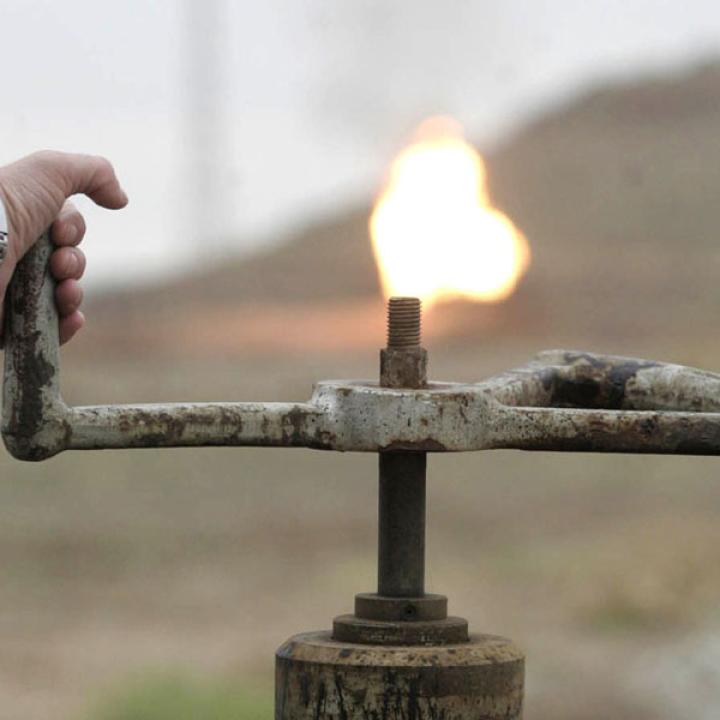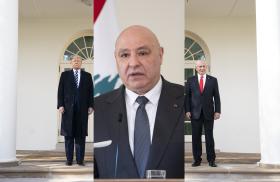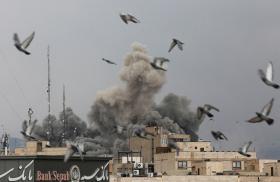
- Policy Analysis
- Fikra Forum
Facing Fiscal Pressures: Iraq’s Struggle for Reform Ahead of the 2025 Election

Baghdad’s oil dependency is a risk for long-term stability, but making the necessary changes will mean confronting political elites who benefit from the status quo.
In November 2025, Iraqis will head to the polls for a parliamentary election. Regardless of who becomes the next power broker in Baghdad, the time is ripe to assess how the country has been governed—particularly concerning its fiscal management and economic development. Since Saddam Hussein’s fall in 2003, Iraq has consistently pursued two interdependent development goals. One has been to break free from its rentier economic model by revitalizing its non-oil sectors and reducing its heavy reliance on crude oil exports. The second has been to develop the physical infrastructure required to achieve that goal. Ultimately, that requires diverting public spending away from recurrent expenditures like ever-increasing public sector salaries and toward investment in physical assets. Disruptive as that may be for the public sector, those financial resources are crucial for the improvements to infrastructure that will bring about private sector-led growth and achieve the diversification needed to improve the Iraqi economy.
Public finance data from the Federal Government of Iraq (FGI) has shown that the current government, like those before it, has made little to no progress in achieving either goal. As a result, it is facing another oil-driven fiscal shortfall. Last year, the oil price required to balance the budget increased to $84 per barrel, according to an IMF estimate. With oil prices hovering around $67 per barrel, Iraq’s petroleum revenues, which account for more than 93 percent of total government income as of 2025, are no longer sufficient to cover planned public expenditures. This fiscal pressure suggests that the government led by Prime Minister Mohammed Shia al-Sudani has not freed itself from the legacy of oil dependency. It continues to prioritize spending on public sector salaries and social welfare benefits at the expense of the difficult but necessary reforms required to build a growing economy.
No government can reasonably be expected to address all of Iraq’s structural economic imbalances and fiscal issues within a single four-year term, but each has both the opportunity and the responsibility to begin addressing them. The necessary solutions are well known; however, they come with trade-offs that are difficult to accept because of the political economy that emerged in post-2003 Iraq, which has reinforced short-term patronage-driven spending over long-term development. This has been the major impediment that has prevented successive governments from pursuing meaningful reforms. Here, the Iraqi parliament plays a decisive role in shaping national budget laws and in determining how and where public funds are allocated. This state of affairs comes at an increasingly high cost, as it makes the FGI vulnerable to fluctuations in international energy markets and has led to several fiscal crises since 2015.
Historically, every major drop in oil prices has immediately sent shockwaves through the entire Iraqi economy and triggered renewed calls for reform, particularly around economic diversification. The 2020 white paper Emergency Cell for Financial Reforms and the 2016 IMF Stand-By Arrangement are two notable examples. However, once oil prices recover, political momentum for reform tends to fade, and Iraq’s ruling elite returns to business as usual. The government deserves some credit for reducing the national poverty rate from 20.1 to 17.5 percent between 2018 and 2024 by spending on social protection programs, but it has made virtually no progress on fiscal policy reform.
Crucially, Iraq’s political economy also explains the root causes of its poor fiscal management. Rentier dynamics have produced deeply rooted public expectations of state generosity. More than 40 percent of Iraq’s workforce is employed in public-sector or state-owned enterprises, which have taken 59 percent of all public expenditures of the FGI in the first half of 2025. This leaves little space for long-term investment and any attempt to cut subsidies or restructure the payroll risks provoking popular backlash. Prime Minister Haidar Al-Abadi (2015–18) observed this when his early reform efforts were met with mass protests.
Likewise, Iraq’s fragmented muhasasa political system, which divides institutions along ethnosectarian lines, continues to play a significant role in maintaining patronage networks. Ministries are often treated as party fiefdoms, primarily serving the interests of their respective parties rather than the public good. This institutional fragmentation hinders coherent decision-making. It is also largely responsible for another of Iraq’s major challenges: endemic corruption. Procurement processes frequently involve inflated contracts and political kickbacks to feed political parties and armed groups. Federal and regional oversight bodies such as the Integrity Commission and the Board of Supreme Audit lack enforcement power. Instances of ministerial positions being bought or sold during bargaining to form a government have further eroded trust in public institutions.
Short-Term Solutions, Long-Term Consequences
To address the ramifications of falling oil revenues, the FGI has relied on several short-sighted measures, none of which tackle the root causes of the recurring fiscal crises. One has been to reduce public investment spending. This has become the default austerity measure in Iraq: to prioritize essential recurring expenditures such as salaries and pensions, which comprised more than 60 percent of total spending in the 2024 federal budget. By contrast, funding for developmental projects—such as infrastructure and services that are critical to building a diversified economy—is the first thing to be reduced or postponed. The 2025 fiscal outlook appears to be following the same pattern. In the first six months of the year, total investment spending fell to just 3.9 trillion dinars, representing only 6.9 percent of total expenditures (56.7 trillion dinars).
Another stopgap measure often employed during oil-driven fiscal shortfalls is to draw down the foreign reserves of the Central Bank of Iraq (CBI), which stood at $111 billion in 2023 and now sits at $104 billion. While this can provide temporary fiscal relief, it carries significant long-term risks. Continued depletion of foreign reserves weakens Iraq’s monetary buffer and could potentially destabilize the dinar. This tactic may postpone budget pressures, but it undermines financial stability and confidence in the broader economy.
A third approach to managing fiscal shortfalls is adjusting the CBI’s fixed exchange rate. In December 2020, amidst a collapse in oil prices, the CBI devalued the dinar by 22.7 percent, changing the official rate from 1,190 to 1,460 dinars to the U.S. dollar. This move was designed to increase the dinar value of oil revenues when converted from U.S. dollars and reduce the fiscal deficit. However, in February 2023, as oil prices recovered, the dinar was revalued to 1,300 per U.S. dollar. With the election approaching, a devaluation similar to the one in 2020 seems unlikely, as it would erode Iraqi voters’ purchasing power. Notwithstanding, devaluation may become a tool in 2026 if oil prices remain in the $60s per barrel and foreign reserves fall below $60 billion, a critical threshold for economic stability. The FGI sells its oil in U.S. dollars, but most of its expenditures are in Iraqi dinars, so it could provide temporary relief. However, these drastic and opportunistic changes in the exchange rate undermine the CBI’s monetary credibility and could lead to political and social unrest.
Each of these short-term measures (cutting public investment, drawing down foreign reserves, and manipulating the exchange rate) has inflicted significant costs. More importantly, they have served to delay the structural reforms Iraq urgently needs. This pattern of behavior reflects a political economy shaped by entrenched myopic interests, rent-seeking behaviors, and fiscal indiscipline, all of which have stifled progress and reinforced the country's economic imbalances.
The Road to Reform: Obstacles and Possibilities
Despite these formidable challenges, fiscal reform is not impossible. It could be achieved if backed by pressure from Iraqi citizens and a coalition of political actors willing to make unpopular decisions for the sake of long-term stability and economic growth. Iraq’s political economy has so far prevented it from implementing technocratic reforms, particularly those that enhance institutional capacity, such as digitization or anti-corruption systems. Ruling political parties and armed groups have exploited their control over ministries to appoint loyalists to senior civil service positions, known as “special grades.” These positions serve as an avenue for officials to access and divert state resources, reinforcing patronage networks and perpetuating systemic corruption.
Despite these challenges, there have been serious attempts to correct Iraq’s fiscal trajectory. For example, since the mid-2000s, the Iraqi Finance Ministry has received international support—initiated by USAID, the World Bank, the EU, and the German Agency for International Cooperation—to implement an Integrated Financial Management System (IFMIS). This system exposes corrupt practices by locking core public financial management processes into a transparent, rules-based, and auditable system. However, adoption has been limited, and the project is still undergoing pilot testing. Unsurprisingly, these efforts have also been obstructed by politicians who continue to reap the benefits of the clientelist system. Without strong political will and enforcement, these programs will remain partially implemented, and corruption will persist. Iraq has the potential to break free from its oil dependency and to build a more resilient and diversified economy, but it will require a bold commitment to reform and sustained engagement from political leaders and citizens alike.


